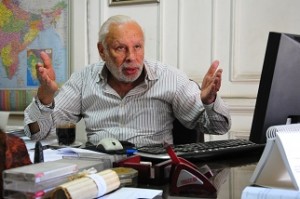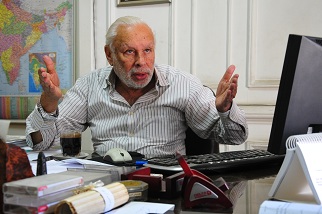
(PHOTO BY HASSAN IBRAHIM)
The government-affiliated National Council for Human Rights had an operative role in the aftermath of the revolution, and in particular following the 14 August, 2013 dispersal of the sit-ins at Rabaa Al-Adaweya and Nahda squares.
Following the dispersal, the council issues a detailed report of the violations that occurred, both in the dispersal and in the period following the 3 July ouster of former president Mohamed Morsi.
George Ishaq, one of the founding members of the major oppositional movement Kefaya during the Mubarak regime, joined the council in August 2013.
How do you view the NCHR’s role in protecting human rights in Egypt?
The council is not satisfied with human rights in Egypt, and for this reason we are now preparing a report on our activities in the recent past to clarify the negatives and positives as openly as possible. However, the situation in Egypt has improved noticeably.
What has the council done with regards to violations within police stations? Has the Ministry of Interior responded to some of these requests?
The ministry has responded to some of our requests and made a list of prisoners. Approaching the subject of this list was a huge risk – a red line – and of course we did not have ambitions to do this at the beginning of our work. This is among the things we have done, and we will continuously visit prisons and file a report with the prosecutor general if any violations are found. We have established a plan to visit places of detention and police stations because violations do take place within police stations, and in the beginning ten stations will be visited, for which arrangements are currently being made.
How do you view the rights situation following the recommendations issued by the Human Rights Council in Geneva to Egypt?
The recommendations made by 125 countries after regular, comprehensive review by the UN Human rights Council in Geneva require Egypt to prepare a response to these reservations in an objective manner in March. These many recommendations prove that society faced very strong mobility during the two revolutions during which many infringements were committed, and we do not deny a decline in the human rights situation in Egypt. However, we must remember the unstable circumstances the country passed through over the past four years.
What is your opinion on the protest law, especially since the recommendations at the Universal Periodic Review demanded that it be amended?
The NCHR recommended that the government amend the Protest Law, and if Egypt amended the law before travelling to Geneva, most of the reservations regarding restricting freedom of opinion or expression and random arrests during demonstrations would not be applicable. However, Egypt did not enact this amendment, and in spite of itself it will amend the law before returning in March to demonstrate its acceptance of these recommendations.
How do you evaluate the report of the 30 June fact-finding committee?
The report of the 30 June fact-finding committee regarding the dispersal of the Rabaa Al-Adaweya sit-in last year was accurate and relied on the facts.
What about the report issued by the CIA on torture in the United States?
I want to tell the US to be careful when talking with us about human rights and look at the report issued about the methods practiced by the CIA against many detainees accused in terrorism-related cases. The report was considered a disaster on all accounts, and the US army used many methods that are internationally prohibited and represent a violation of the US constitution. The detainees were tortured in US prisons.




